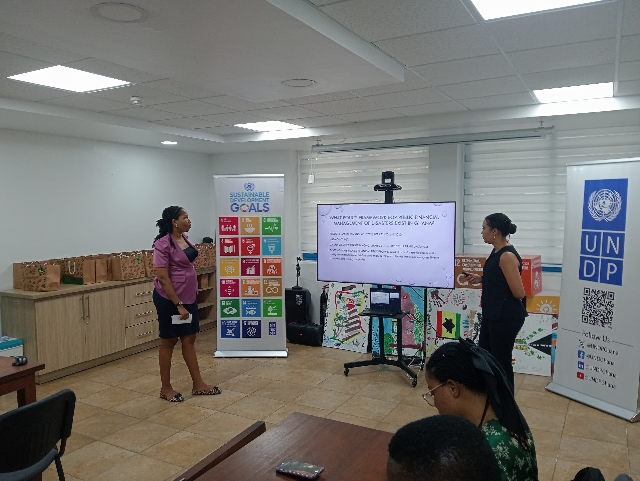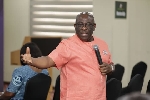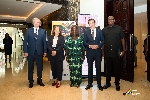UNDP, stakeholders develop Ghana’s disaster management and risk finance strategy framework
 Stakeholders at the workshop making a presentaion in Accra
Stakeholders at the workshop making a presentaion in Accra
The United Nations Development Programme (UNDP), Ghana has brought together key government agencies, industry players, and risk experts in Accra to develop a national strategy that will improve Ghana’s ability to finance disaster response quickly and efficiently.
Organized through UNDP’s Insurance and Risk Finance Facility (IRFF), the stakeholders engagement workshop convened representatives from the Ministry of Finance, National Insurance Commission (NIC), National Disaster Management Organization (NADMO), Environmental Protection Agency (EPA), National Development Planning Commission (NDPC), Ghana Hydrological Authority, Ghana Meteorological Agency, Civil Society Organisations, and leading risk modelling experts.
The objective is to co-create a Disaster Management and Risk Finance Strategy Framework that will enable Ghana to access faster and more predictable financing when floods, droughts, and other natural hazards occur.
In her opening remarks, Dr. Amina Sammo, Coordinator of UNDP’s Insurance and Risk Finance Facility, described the workshop as an opportunity to shape a robust national strategy through collaboration among ministries, regulators, insurers, development partners, and technical experts.
“This initiative isn’t only about policy, it’s about real people: the waakye sellers, Koko vendors, charcoal traders in inner-cities, Zongo communities, and farmers whose livelihoods are threatened each time disasters strike,” she said.
Dr. Sammo emphasised that pre-arranged disaster finance, designed and agreed upon in advance, can save lives by ensuring quick and predictable funding in emergencies.
She highlighted innovative tools being considered for the strategy, including parametric insurance, contingency planning, risk financing, and risk-layering mechanisms.
These are aligned with Ghana’s development goals and global frameworks such as the Sendai Framework for Disaster Risk Reduction, the Paris Agreement, and the Sustainable Development Goals (SDGs).
She urged stakeholders to take ownership of the strategy and integrate disaster risk financing into national policies, budgets, and planning processes, stressing that its success depends on collective leadership and decisive action.
Prof. Asaah S. Mohammed, Lead Consultant on the project, encouraged participants to adopt flexible approaches informed by global best practices. He announced that a follow-up session will be held in the weeks to review the draft framework for validation.
The workshop is seen as a significant step in Ghana’s efforts to become a resilient, shock-ready nation capable of protecting its most vulnerable citizens in the face of disasters.
Source: Classfmonline.com/Cecil Mensah
Trending Business

ADB hosts National Farmers’ forum to honour 2025 award winners
06:17
JS Dumelo: Deputy Agric Minister urges politicians and state institutions to embrace, model commercial farming
17:31
GIPC explores investment partnerships with Greece in manufacturing and renewable energy
15:07
Ghana unveils US$3.4 billion plan to become continental leader in renewable energy
12:54
Interior Ministry gives bullion-van operators 45 days to meet new national safety standards
12:52
Parliament approves Health Ministry’s GH¢S 2.8bn budget, highest allocation so far
12:45
GIPC courts German investors with new economic incentives and industrial growth agenda
11:56
Inflation declines to 6.3% for Nov, 11 months in a row
12:57
Transport Ministry: Airport passenger service charge increased to GHS100
07:13
ASSMA's one-week ultimatum threat to mining sector peace, stability - Ghana Chamber of Mines
22:23



